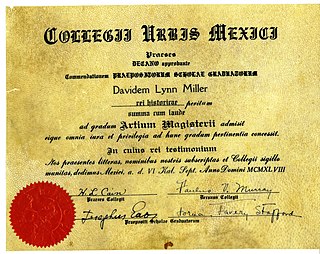Technical and further education or simply TAFE is the common name in Australia for vocational education, as a subset of tertiary education. TAFE institutions provide a wide range of predominantly vocational courses. Colloquially also known as "Tech".
National Vocational Qualifications (NVQs) are practical work-based awards in England, Wales, and Northern Ireland that are achieved through training and assessment. The regulatory framework supporting NVQs was withdrawn in 2015 and replaced by the Regulated Qualifications Framework (RQF), although the term "NVQ" may be used in RQF qualifications if they "are based on recognised occupational standards, work-based and/or simulated work-based assessment, and where they confer occupational competence".

Education in England is overseen by the Department for Education. Local government authorities are responsible for implementing policy for public education and state-funded schools at a local level. State-funded schools may be selective grammar schools or non-selective comprehensive schools. All state schools are subject to assessment and inspection by the government department Ofsted. England also has private schools and home education; legally, parents may choose to educate their children by any suitable means.

The City and Guilds of London Institute is an educational organisation in the United Kingdom. Founded on 11 November 1878 by the City of London and 16 livery companies to develop a national system of technical education, the institute has been operating under royal charter, granted by Queen Victoria, since 1900. The Prince of Wales, later King Edward VII, was appointed the first president of the institute.

A diploma is a document awarded by an educational institution testifying the recipient has graduated by successfully completing their courses of studies. Historically, it has also referred to a charter or official document of diplomacy.
A graduate diploma is generally a qualification taken after completion of a first degree, although the level of study varies in different countries from being at the same level as the final year of a bachelor's degree to being at a level between a master's degree and a doctorate. In some countries the graduate diploma and postgraduate diploma are synonymous, while in others the postgraduate diploma is a higher qualification.
The Imperial Society of Teachers of Dancing (ISTD) is an international dance teaching and examination board based in London, England. The registered educational charity, which was established on 25 July 1904 as the Imperial Society of Dance Teachers, provides training and examinations in a range of dance styles and certified dance teacher courses. The ISTD is recognised by the Qualifications and Curriculum Authority and the Council for Dance Education and Training and is also a member of the British Dance Council. It hosts various competitions in many different formats including Modern Ballroom, Latin American, Classical Ballet and Tap Dance as well as contemporary styles like Disco Freestyle.
Higher National Diploma (HND), part of the Higher Nationals suite of qualifications, is an academic higher education qualification in the United Kingdom and various other countries. They were introduced in England and Wales in 1920 alongside the Ordinary National Diploma and the Higher National Certificate. A qualification of the same title is also offered in Argentina, Brunei, Cameroon, India, Malta, Nigeria, Ghana, Kenya, and some other countries.

The Australian Qualifications Framework (AQF) specifies the standards for educational qualifications in Australia. It is administered nationally by the Australian Government's Department of Industry, with oversight from the States and Territories, through the Standing Council of Tertiary Education Skills and Employment. While the AQF specifies the standards, education and training organisations are authorised by accrediting authorities to issue a qualification.
TAFE NSW is an Australian vocational education and training provider. Annually, the network trains over 500,000 students in campus, workplace, online, or distance education methods of education. It was established as an independent statutory body under the TAFE Commission Act 1990. The Minister for Regional Development, Skills and Small Business is responsible for TAFE NSW.
Laine Theatre Arts, sometimes referred to as Laines, is an independent performing arts college, based in the town of Epsom in Surrey, England. The college was founded in 1974 by former professional dancer and dance teacher Betty Laine OBE, and developed from an earlier school, the Frecker-Laine School of Dancing. It provides specialist vocational training in dance and musical theatre.
Performing arts education in Australia refers to the teaching of different styles of creative activity that are performed publicly. The performing arts in Australia encompasses many disciplines including music, dance, theatre, musical theatre, circus arts and more. Performing arts education in Australia occurs both formally and informally at all levels of education, including in schools, tertiary institutions and other specialist institutions. There is also a growing body of evidence, from the Australian Council for the Arts and the Parliament of Australia, showing that First Nation's participation in the arts and culture has significant economic, social and cultural benefits to Australia and further supports the outcomes of the Australian governments ‘Closing the Gap’ campaign. There has been an increasing number of scholarships opening up in educational institutions for Indigenous Australians aimed at encouraging this participation in the arts.
Bird College – Conservatoire for Dance and Musical Theatre is an independent performing arts college, located in Sidcup, South East London, in the London Borough of Bexley.

Trinity College London (TCL) is an examination board based in London, United Kingdom which offers graded and diploma qualifications across a range of disciplines in the performing arts and English language learning and teaching. Trinity College London has examined over 850,000 candidates in more than 60 countries worldwide. It is a registered charity in England, Wales and Scotland, and its Patron is HRH The Duke of Kent.
SLP College is an independent, co-educational performing arts college based in Garforth near Leeds, West Yorkshire, England.
The Malaysian Qualifications Framework or the MQF is a unified system of post secondary qualifications offered on a national basis in Malaysia. It is administered by the Malaysian Qualifications Agency (MQA), a statutory body under the purview of the Ministry of Higher Education (MOHE).
In the UK education sector, there are a wide range of qualification types offered by the United Kingdom awarding bodies. Qualifications range in size and type, can be academic, vocational or skills-related, and are grouped together into different levels of difficulty. In England, Wales and Northern Ireland, qualifications are divided into Higher Education qualifications, which are on the Framework for Higher Education Qualifications (FHEQ) and are awarded by bodies with degree awarding powers, and Regulated qualifications, which are on the Regulated Qualifications Framework (RQF) and are accredited by Ofqual in England, the Council for the Curriculum, Examinations and Assessment in Northern Ireland and Qualifications Wales in Wales. In Scotland, qualifications are divided into Higher Education qualifications, Scottish Qualifications Authority qualifications and Scottish Vocational Qualifications/Modern Apprenticeships, which are on the Scottish Credit and Qualifications Framework (SCQF). Scottish Higher Education Qualifications are on both the SCQF and the FHEQ.

Stella Mann College of Performing Arts is an independent, co-educational performing arts school and college specialising in dance and musical theatre. The college is located in the Harpur area of Bedford, Bedfordshire, England.

Performers College is an independent, co-educational college specialising in performing arts. It is based across four sites in Birmingham, Brighton, Essex and Manchester.
The Council for Dance, Drama and Musical Theatre (CDMT), formerly known as the Council for Dance Education and Training (CDET), is the quality assurance and membership body for the professional dance, drama and musical theatre industries in the United Kingdom. CDMT was founded in 1979.






